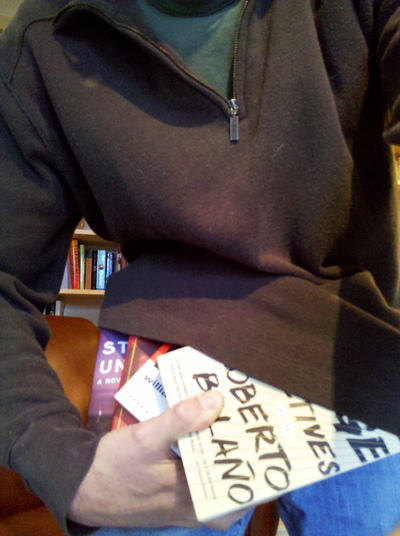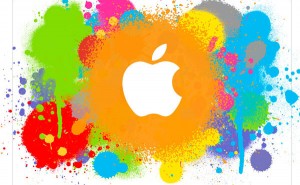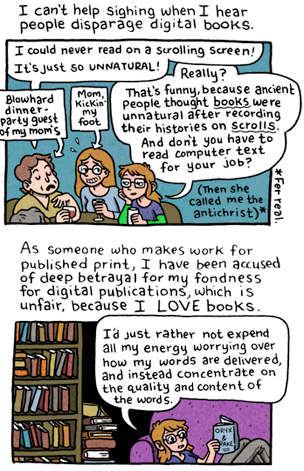 Open Letters Monthly has an article called In Defense of the Memory Theater, by Nathan Schneider in which he argues that books on shelves perform the function of reflecting memories back at us. They are a constant reminder of the various events, stages, and emotional states of our lives. We look at our shelves and can instantly catapult ourselves back in time to events surrounding our reading of various volumes.
Open Letters Monthly has an article called In Defense of the Memory Theater, by Nathan Schneider in which he argues that books on shelves perform the function of reflecting memories back at us. They are a constant reminder of the various events, stages, and emotional states of our lives. We look at our shelves and can instantly catapult ourselves back in time to events surrounding our reading of various volumes.
Schneider mentions a 16th-century memory theater that used images and symbols of the cosmos to inspire observers and enhance their intellectual powers. Books, for Schneider, do something similar when they are visible on our shelves. I agree up to a point. I am often taken back in time by my own books upon their shelves. But so am I transported by nearly every object in my home. Objects all have this power. Books are not exceptional in this regard.

 I sat down with my Kindle e-reader on Saturday morning to read the Los Angeles Times. There was an article about an L.A. used bookstore called
I sat down with my Kindle e-reader on Saturday morning to read the Los Angeles Times. There was an article about an L.A. used bookstore called  There’s been a huge battle of the ebooks going on between Amazon.com and publisher Macmillan. Last week, Macmillan, in response to rotten Apple’s announcement of $14 and $15 ebooks on its new iPad, insisted that Amazon give Macmillan the right to choose its own higher ebook pricing for the Kindle ereader device. Amazon got peevish about the deal and simply de-listed all of Macmillan’s books. I thought that was a nice nasty smack in the kisser for a doomed publisher at the time. I was feeling so good about Amazon and its Kindle and so snitty about Apple’s iPad that I was within 60 minutes of plunking my digital money down on a brand new shiny Kindle. But wait! Amazon caved! They rolled over and gave Macmillan what it wanted.
There’s been a huge battle of the ebooks going on between Amazon.com and publisher Macmillan. Last week, Macmillan, in response to rotten Apple’s announcement of $14 and $15 ebooks on its new iPad, insisted that Amazon give Macmillan the right to choose its own higher ebook pricing for the Kindle ereader device. Amazon got peevish about the deal and simply de-listed all of Macmillan’s books. I thought that was a nice nasty smack in the kisser for a doomed publisher at the time. I was feeling so good about Amazon and its Kindle and so snitty about Apple’s iPad that I was within 60 minutes of plunking my digital money down on a brand new shiny Kindle. But wait! Amazon caved! They rolled over and gave Macmillan what it wanted.
 Cartoonist Lucy Knisley has a comic online called
Cartoonist Lucy Knisley has a comic online called